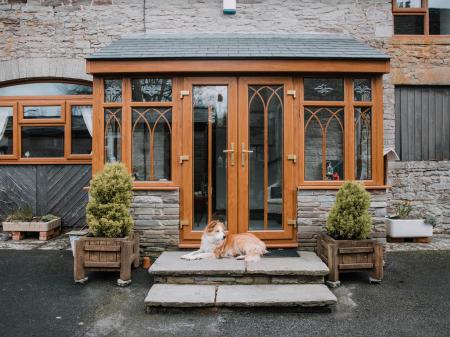
History
The vexillation fort at Clyro is a large site, covering roughly 26 acres. It was established around AD 60 as part of Roman attempts to subdue the Silures tribe of mid Wales. The fort occupies a small hilltop only a few hundred yards on the Welsh side of the river.
Definition
A vexillation fort usually covered 20-30 acres and was made to hold both legionary and auxiliary troops, as well as offering a storage depot and serving as a winter base during a major campaign.
The fort measures about 1300 feet on a north-east to south-west axis, with a width of about 860 feet. The earthwork ramparts were defended by a double-ditch and would have been topped by a palisade of timber posts.
The site was used briefly twice and then completely abandoned before AD 69. Excavations revealed very few finds beyond sherds of Samian ware pottery, ovens, and the base of a donkey mill.
There is a smaller marching camp at Clyro itself, emphasising the importance of the area to the Romans. The remains of a nearby early medieval motte show that the Normans also realised the importance of the Clyro river crossing.
There is very little in the way of remains to see on the ground. The site lies in a farm field beside Boatside Farm, and is bounded to the eat by the Offa's Dyke Path and the river. The site can be seen from the minor road running past the farm, and one edge of the hilltop site can be seen from the Offa's Dyke Path, but for a closer look, please ask at the farm for permission.
A Deadly Battle
Clyro has been put forward as the site of a conflict between the Roman 20th Legion and the Silures tribe. As the Roman historian Tacitus recounts in his Annals, a camp prefect and several cohorts were deputed to build garrison posts in Silurian territory.
The Silurians attacked, killing the prefect, 8 centurions, and 'the boldest' of the rank and file soldiers. If not for the timely arrival of reinforcements from nearby camps, the legion would have been lost 'to the last man'.
 We've 'tagged' this attraction information to help you find related historic attractions and learn more about major time periods mentioned.
We've 'tagged' this attraction information to help you find related historic attractions and learn more about major time periods mentioned.




